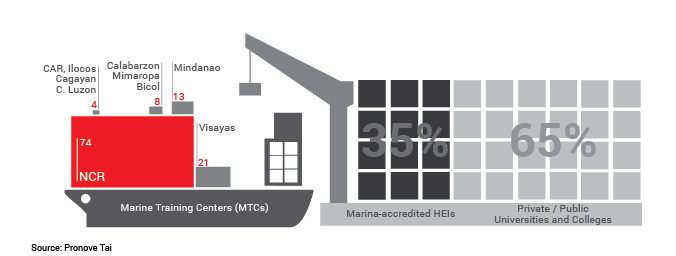Quality of education and training is a great challenge that recruitment and manning agencies for shipping companies take up to ensure the global fleet of cargo vessels and cruise ships are manned by qualified and certified Filipino seafarers.
Worldwide demand, in 2010 alone, was at 637,000 officers but there were only around 624,000 officers deemed fit to fill the vacancies. The Philippines was able to deploy more than half of the demand at 347,150 seafarers in 2010. In 2013, almost 38,000 additional crew left to board various vessels around the world. The cruise shipping industry already employs 61,700 Filipinos with an unmet demand of, at least, 47,000 more.
“The numbers are mind-boggling, and with new ships in the pipeline, demand will be even more difficult to meet,” says Monique Cornelio-Pronove, CEO of Pronove Tai. Having worked recently with V-Ships, Monique observed that young Filipinos still see maritime careers as opportunities to financial stability, but many are now also attracted to the higher-paying jobs at business process outsourcing (BPOs) centers. Not only are companies competing for talent with BPOs but also for new, energy-efficient workspaces and progressive environments.
How do we now compete and secure these valuable assets?
Recruiting and training ‘diamonds in the rough’ right at their doorsteps
There are almost 800 higher education institutions (HEIs) in the country with courses and programs dedicated to maritime transportation and engineering, deck support, hotel and restaurant management (HRM), culinary arts, housekeeping, and even cruise liner operations. These HEIs are composed of Marina-accredited institutions (208 HEIs) and private / public universities and colleges (590 PPUCs).
Of the 208 Marina-accredited HEIs, the highest concentrations are in the following areas:
- Region 6: 32 HEIs (15%)
- NCR-MM: 28 HEIs (13%)
- Region 7: 28 HEIs (13%)
- Region 4: 23 HEIs (11%)
- Region 3: 21 HEIs (10%)
There are also 590 private and public universities and colleges aside from the 208 Marina-accredited HEIs that are potential recruitment bases for cruise ships. These are institutions with diploma and certificate programs in hotel and restaurant management (HRM), culinary arts and housekeeping. Other universities have customized programs for cruise liner operations.
For HRM alone, the Commission on Higher Education estimates 120,000 graduates are generated each year. However, these graduates are not immediately employable in ships, as they will need additional skills training to qualify for maritime service.
Only 120 ‘post-graduate’ maritime training centers are available throughout the country to accommodate and train applicants from these 798 educational institutions. Moreover, most of the training centers are highly specialized in bridge simulation, navigation, engine room and cargo operations. There are only a few that offer specialized trainings and simulation arenas for cruise liners such as culinary and restaurant operations, child care, and housekeeping.
Of the 120 maritime training centers in the Philippines, 74 centers are located in Metro Manila while 46 centers are located in the different regions. The National Capital Region has a disproportionately high number of training centers, a large number of which are located in Ermita and Malate.
If the goal is to attract many potential seafarers, recruitment and skills training need to happen at their doorsteps. This could mean establishing more training centers in regions with a higher number of unserved HEIs and universities and colleges. Prospective trainees will welcome the reduced costs or burden of looking for board and lodging arrangements in Manila should they come all the way from far-flung regions. Documentary requirements, tests and health clearances can be easily processed and managed when a trainee no longer goes back and forth to his hometown to fetch additional requirements.
Build-to-suit training centers ensure quality outcomes
The Philippine government and all stakeholders in our national maritime industry are still navigating the murky waters of quality education and training. Integrated simulation-based learning and hands-on training in navigation and steering, safety, housekeeping, guest relations, galley / kitchen operations offer much hope but require adequate space for the right equipment, technology and team sessions.
Information Technology (IT) Parks and BPO centers are well suited for the recruitment and training needs of the big data, high-traffic tenant. The new buildings have the infrastructure and the network architecture to support these types of training centers. They can be built-to-suit or customized with added ventilation, cooling and heating, as well as overhead distribution systems for workspaces such as kitchens and engines rooms. Floorplates are bigger to make planning and staggered expansions easier especially dedicated areas for full simulation, bigger classrooms, meeting areas and conference centers. These types of properties can also accommodate temporary living quarters or hostels for visitors and crew.
The Philippines is already home to these state-of-the-art facilities. Metro Manila, Clark, Subic, Santa Rosa, Cebu, Iloilo, Bacolod and Davao have mixed-use developments such as business and residential parks in close proximity to international airports and large seaports; hospitals, medical clinics, recreational facilities and commercial establishments. Monique Cornelio-Pronove shares an insight, “Establish your presence in new areas as these to help attract potential seafarers and build the image of the shipping company as a world-class employer. New environments that offer dynamic lifestyles and opportunities are what young Filipinos of calibre look for.”
Benefits of working with a tenant representative
Pronove Tai has had broad experience of working with multi-national and local firms on different property challenges. As an international property consultant specializing in tenant representation, we are in the business of searching for opportunities for our clients whether the objective is leasing, sales, build-to-suits, finding the best fit / property and negotiating with the landlord on behalf of the client. Pronove Tai also provides impartial advice and ensures that the best value is achieved from competing offers.
If you wish to know more about the challenges and benefits of setting up a new training center in Metro Manila or major regional hubs in the Philippines, talk to us.

